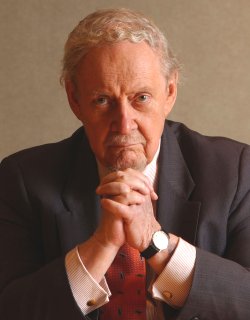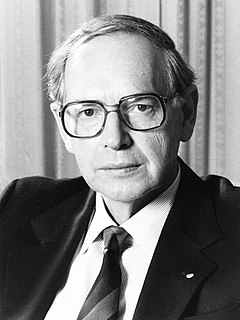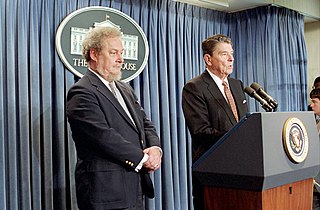Related Research Articles

Robert Heron Bork was an American judge, government official, and legal scholar who served as the Solicitor General of the United States from 1973 to 1977. A professor at Yale Law School by occupation, he later served as a judge on the influential U.S. Court of Appeals for the D.C. Circuit from 1982 to 1988. In 1987, President Ronald Reagan nominated Bork to the U.S. Supreme Court, but the U.S. Senate rejected his nomination after a highly publicized confirmation hearing.

Sir Ninian Martin Stephen was an Australian judge who served as the 20th governor-general of Australia, in office from 1982 to 1989. He was previously a justice of the High Court of Australia from 1972 to 1982.
The 1997 Constitution of Fiji was the supreme law of Fiji from its adoption in 1997 until 2009 when President Josefa Iloilo purported to abrogate it. It was also suspended for a period following the 2000 coup d'état led by George Speight.

The Fijian coups d'état of 1987 resulted in the overthrow of the elected government of Fijian Prime Minister Timoci Bavadra, the deposition of Elizabeth II as Queen of Fiji, and in the declaration of a republic. The first coup d'état, in which Bavadra was deposed, took place on 14 May 1987; a second coup d'état on 25 September ended the monarchy, and was shortly followed by the proclamation of a republic on 10 October. Both military actions were led by Lieutenant Colonel Sitiveni Rabuka, then third in command of the Royal Fiji Military Forces.
Sir Harry Talbot Gibbs, was Chief Justice of the High Court of Australia from 1981 to 1987 after serving as a member of the High Court between 1970 and 1981. He was known as one of Australia's leading federalist judges although he presided over the High Court when decisions such as Koowarta v Bjelke-Petersen in 1982 and Commonwealth v Tasmania expanded the powers of the Commonwealth at the expense of the states. Gibbs dissented from the majority verdict in both cases. On 3 August 2012, the Supreme Court of Queensland Library opened the Sir Harry Gibbs Legal Heritage Centre. It is the only legal heritage museum of its kind in Queensland and features a permanent exhibition dedicated to the life and legacy of Sir Harry Gibbs.
John Leslie Toohey, AC, QC was an Australian judge who was a Justice of the High Court of Australia from 1987 to 1998.
Sir Vijay Raghubar Singh, KBE was an Indo-Fijian lawyer and politician who held Cabinet office in the 1960s and 1970s. Vijay Singh served in Prime Minister Ratu Sir Kamisese Mara's government in a variety of positions, including Attorney-General, and was president of the Indian Alliance, a division of the ruling Alliance Party. He quit the party in 1979 following disagreement with Alliance leadership and later joined the opposition National Federation Party. Vijay Singh was involved in the restructure of the Fiji sugar industry and was a leading member of the Jaycees movement in Fiji.
Qoriniasi Babitu Bale was a lawyer and politician who served twice as Fiji's Minister for Justice and Attorney-General, most recently from 2001 to 2006, when he was deposed in the military coup of 5 December. Like many of Fiji's most influential leaders, Bale was a native of Levukana in Vanua Balavu in the Lau Islands.

The Dominion of Fiji was the official name of Fiji between October 1970 and 6 October 1987. When British rule ended in 1970, the Colony of Fiji was given independence as a Dominion, in which the British monarch, Elizabeth II, remained head of state as Queen of Fiji, represented by the Governor-General. The Republic of Fiji, removing Queen Elizabeth II as head of state, was proclaimed on 6 October 1987 after two military coups.
Mohammed Taiyab Khan was an Indo-Fijian politician and lawyer. Between 1966 and 1977 he served as a member of the Legislative Council, Senate and House of Representatives. He was also Minister for Commerce, Industries and Co-operatives from 1972 to 1976.

Tuiloma Neroni Slade held the post of secretary general of the Pacific Islands Forum Secretariat from 2008 to 4 December 2014. He was elected to the position for three years on 20 August 2008. Slade was reappointed to a second term by the leaders of the Pacific Islands Forum on 8 September 2011.

Betty Cantrell Roberts was an American politician and judge from the U.S. state of Oregon. She was the 83rd Associate Justice of the Oregon Supreme Court, the highest state court in Oregon. She was the first woman on the Oregon Supreme Court, and had also been the first woman on the Oregon Court of Appeals. Roberts served from 1982 to 1986 on the high court and from 1977 to 1982 on the Court of Appeals.

On July 1, 1987, President Ronald Reagan nominated Judge Robert Bork for Associate Justice of the Supreme Court of the United States, to succeed Lewis F. Powell Jr., who had earlier announced his retirement. At the time of his nomination, Bork was a judge on the United States Court of Appeals for the District of Columbia Circuit, a position to which he had been appointed by President Reagan in 1982.
Speculation abounded over potential nominations to the Supreme Court of the United States by Ronald Reagan even before his presidency officially began, due to the advanced ages of several justices, and Reagan's own highlighting of Supreme Court nominations as a campaign issue. Reagan had promised "to appoint only those opposed to abortion and the 'judicial activism' of the Warren and Burger Courts". Conversely, some opposed to Reagan argued that he could "appoint as many as five Justices" and would "use the opportunity to stack the Court against women, minorities and social justice".
The nominations made by Lyndon B. Johnson to the Supreme Court of the United States are unusual in that Johnson appeared to have had specific individuals in mind for his appointments and actively sought to engineer vacancies on the Court to place those individuals on the court.
Sir James Peter Quilliam was a New Zealand lawyer and jurist. He served as Chief Justice of the Cook Islands and a judge of the High Court of New Zealand.
Frank G. Mahady was a Vermont attorney and judge. He was appointed to the Vermont Supreme Court in 1987, but never confirmed by the Senate; he withdrew his confirmation request on April 3, 1988.

Sir Ragnar Hyne was a Norway-born lawyer who served in several British colonies. He was Attorney General of Sierra Leone and Chief Justice in both Fiji and Tonga.
Sir Robert Lindsay Munro was a New Zealand-born lawyer who held several prominent positions in Fiji, including being the first chairman of the Fijian Broadcasting Corporation and the first President of the Senate.
References
- 1 2 3 Transition Pacific Islands Monthly, July 1988, p45
- ↑ Fiji Focus, Department of Information, 1982, p13